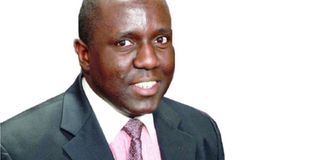Will 2021 tone down national stalemate?

Author, Karoli Ssemogerere. PHOTO/FILE.
On February 16, the Electoral Commission’s chairperson Justice Simon Byabakama declared incumbent Yoweri Museveni president-elect with 58.64 per cent of the vote.
He further announced Robert Kyagulanyi, aka Bobi Wine, runner up with 34.83 per cent of the vote. FDC, the largest Opposition party in Parliament, whose candidate Patrick Oboi Amuriat ran his entire campaign “bare foot,” collected 3 per cent of the vote.
Many observations abound. About 2.5 million votes separate the winner from the challenger. Ahead of the January poll, final Electoral Commission figures pointed out that the top 10 districts in percentage increase of registered voters were mostly in Karamoja (which went heavily for NRM) and Buganda (which went in the reverse direction).
This turnout ended up as a massacre for the ruling party in Buganda as the post Bush War consensus simply evaporated pinning the entire Cabinet contingent from Buganda. The election was also bad news for both FDC and DP, which were nearly shredded in the same election. The three way split in FDC (defiance, moderation- mostly ANT and Independents) all tipped away.
Voting for NRM was fervent in its strongholds, in the west, but also surprisingly in the north. NUP swept the board in Buganda, but also in neighbouring Busoga, where even though NRM swept the majority of parliamentary seats, it lost in the presidential race.
Urban and peri-urban areas probably on the backdrop of a struggling economy, reaction to a campaign marked by use of force melted the vote for NRM. Kampala and surprisingly Kalangala had the same result, 70 per cent for the Bobi Wine and 25 per cent for Museveni. Formerly safe NRM areas, Luweero, Kiboga, Mityana and even Mpigi quickly slipped away joining Masaka, Kampala.
In Busoga, the result has been pinned on the collapse in sugarcane prices and a glut in production. The situation in Buganda is not very different as coffee prices have fallen by 40 per cent since 2018.
One of the challenges of Uganda’s electoral processes for the foreseeable future is the limited capacity of the Electoral Commission to regulate State actors during the election period. Even though an informal mechanism to moderate this body has been in place since 1996, with appointment of non-political actors, this mechanism probably has to be replaced by an all-party commission.
In Parliament where NRM will continue to enjoy a two-thirds majority, early tests of NRM winners from areas where the NUP presidential candidates prevailed will come into play at the election of the Speaker, where incumbent Rebecca Kadaga, is favoured even though the president spectacularly lost in Kamuli District. No clear constitutional agenda is on the table for this Parliament even though a clear failure to discuss transition at this past-election, has major consequences for the country.
The striking of the two term presidential term limit by the Constitutional Court, which also struck out the safe harbour of two extra years MPs had written into law in exchange for lifting the age limit, has started to look like a pyrrhic victory.
Some grand bargain for the incumbent and change in the form of government to meet the challenges of a young and restive population dealing with unemployment and lack of economic opportunities is necessary.
The President will also have to grapple with tactfully returning the army to the barracks. This will not be easy as unrest and tension require political rather than military solutions.
Two of the president’s cadres both generals - Kahinda Otafiire and Jim Muhwezi, may offer some advice after they both fell in the 2016 elections. Otafiire, who felt he was manipulated out for singing off-key, said he was embarrassed, even though he had grounds, he chose not to petition because he was the minister in charge of elections, he could not sue his employees.
Muhwezi miraculously returned to Parliament after an FDC wave wiped him out in 2016. Both of these gentlemen are former spy chiefs and first rate intelligence officers, they may be able to read the tea leaves where others that replaced them failed.
Mr Ssemogerere is an Attorney-At-Law and an Advocate.




